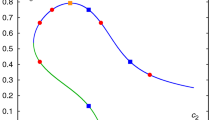Abstract
We introduce partitioned Runge–Kutta (PRK) methods as geometric integrators in the Runge–Kutta–Munthe-Kaas (RKMK) method hierarchy. This is done by first noticing that tangent and cotangent bundles are the natural domains for the differential equations to be solved. Next, we equip the (co)tangent bundle of a Lie group with a group structure and treat it as a Lie group. The structure of the differential equations on the (co)tangent-bundle Lie group is such that partitioned versions of the RKMK methods are naturally introduced. Numerical examples are included to illustrate the new methods.
Similar content being viewed by others
REFERENCES
R. Abraham and J. E. Marsden, Foundations of Mechanics, Addison-Wesley, Second ed., 1978.
V. I. Arnold and B. A. Khesin, Topological Methods in Hydrodynamics, Springer-Verlag, 1998.
A. M. Bloch, R. W. Brockett, and P.E. Crouch, Double Bracket Equations and Geodesic Flows on Symmetric Spaces, Commun.Math. Phys., 187 (1997), pp. 357-373.
A. M. Bloch, P. E. Crouch, J.E. Marsden, and T. S. Ratiu, Discrete rigid body dynamics and optimal control, in Proc.CD C, 37 (1998), pp. 2249-2254.
Engø, On the construction of geometric integrators in the RKMK class, BIT, 40 (2000), pp.41-61.
Engø, Partitioned Runge-Kutta methods in Lie-group setting, Reports in Informatics No.202, Department of Informatics, University of Bergen, Norway, September 2000.
E. Hairer, C. Lubich, and G. Wanner, Geometric Numerical Integration-Structure-Preserving Algorithms for Ordinary Differential Equations, vol.31 of Springer Series in Computational Mathematics, Springer, 2002.
E. Hairer, S. P. Nørsett, and G. Wanner, Solving Ordinary Differential Equations I, Nonstiff Problems, Springer-Verlag, second revised ed., 1993.
Iserles, On Cayley-Transform Methods for the Discretization of Lie-Group Equations, Found. Comput. Math., 1 (2001), pp. 129-160.
D. Lewis, Conservative and approximately conservative algorithms on manifolds, in Dynamics of algorithms (Minneapolis, MN, 1997), vol. 118 of IMA Vol. Math. Appl., Springer, New York, 2000, pp. 31-54.
D. Lewis and J.C. Simo, Conserving algorithms for the dynamics of Hamiltonian systems of Lie groups, J.N onlinear Sci., 4 (1994), pp. 253-299.
D. Lewis and J.C. Simo, Conserving Algorithms for the N Dimensional Rigid Body, Fields Institute Communications, 10 (1996), pp. 121-139.
J. E. Marsden, S. Pekarsky, and S. Shkoller, Discrete Euler-Poincare and Lie-Poisson equations, Nonlinearity, 12 (1999), pp. 1647-1662.
J. E. Marsden and T.S. Ratiu, Introduction to Mechanics and Symmetry, no.17 in Texts in Applied Mathematics, Springer-Verlag, second ed., 1999.
J. Moser and A. P. Veselov, Discrete Versions of Some Classical Integrable Systems and Factorization of Matrix Polynomials, Commun. Math. Phys., 139 (1991), pp. 217-243.
H. Munthe-Kaas, Runge-Kutta methods on Lie groups, BIT, 38 (1998), pp.92-111.
H. Munthe-Kaas, High order Runge-Kutta methods on manifolds, Appl. Numer. Math., 29 (1999), pp. 115-127.
A. P. Veselov, Integrable discrete-time systems and difference operators, Funk. Anal. Priloz, 22 (1988), pp.1-13.
A. Zanna, K. Engø, and H.Z. Munthe-Kaas, Adjoint and selfadjoint Lie-group methods, BIT, 41 (2001), pp.395-421.
Author information
Authors and Affiliations
Rights and permissions
About this article
Cite this article
Engø, K. Partitioned Runge–Kutta Methods in Lie-Group Setting. BIT Numerical Mathematics 43, 21–39 (2003). https://doi.org/10.1023/A:1023668015087
Issue Date:
DOI: https://doi.org/10.1023/A:1023668015087




